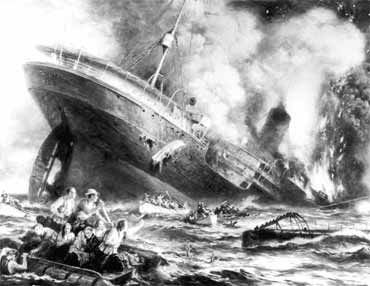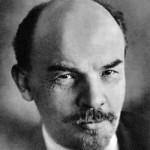America’s entrance:
- German offensive at sea – open target on all Allied ships
Results in America’s anger, and a break in diplomatic relations
- City of Memphis, Illinois – ships with passengers that was torpedoed

- Lusitania – passenger ship that was also carrying munitions and other goods to Britain was targeted (sign that the neutral US was actually supporting the Allied cause)
April 6, 1917: US declares open war on Germany as a result of the attacks and lost American lives
- 200,000 soldiers are sent
- Weapons are outdated
- Germany reacts with swift offensives knowing that they will soon be on the defensive
Russia’s departure: the Russian Revolution
WW1 had weakened an already fragile state (feudal system, outdated methods of production, the rich living off the poor, autocratic state)
- Cities are weaker – soldiers needed, fewer men to work, food is re-routed to the front, not to the urban populations
- 1916-1917: a harsh winter leads to food shortages and greater costs for everyday items
Tsar Nicholas takes personal command of the army and leaves for the Eastern Front, leaving his wife to deal with her personal advisor Rasputin (untrusted by the people)
- March 8, 1917: Petrograd riots over food prices
- March 12, 1917: Army abandons Tsar and mutinies (the Tsar begins to lose power)
- March 13, 1917: Nicholas is forced to abdicate, held under house arrest by new Provisional Government (Alexander Kerensky)
Provisional Government maintains war effort despite public dissatisfaction
 Vladimir Lenin – Socialist revolutionary in exile comes back to Russia for a full revolution and takeover by the workers of the state (with himself at the head)
Vladimir Lenin – Socialist revolutionary in exile comes back to Russia for a full revolution and takeover by the workers of the state (with himself at the head)
- Promises to end the war, redistribute land to peasants and give workers freedoms and rights
- November 6, 1917: Winter Palace is stormed, Provisional Government is arrested, Lenin assumes power
By March 3, 1918, Russia has changed to the USSR – Union of Soviet Socialist Republics
- Withdraws from the war – Treaty of Brest Litovsk
- Loos of territory: Ukraine, Finland, Poland, Baltic States
- Loss of resources: iron, coal
German troops go Westbound to the Western Front
The new Bolshevik government must contend with a crippled government, bad economy, food shortages, as well as a group of people who support change, but by non Bolshevik means – the Mensheviks
This leads to civil unrest – when all is finished, the Bolsheviks are in power, Lenin establishes a dictatorship and begins to rule with an iron fist

what were the neutral powers